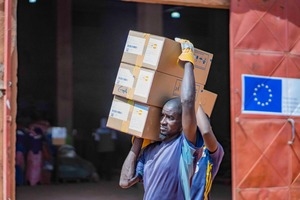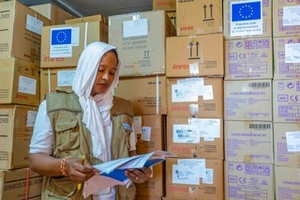share

Unloading of a humanitarian convoy in Mali in 2023. | © T. N’Daou / HI
The Atlas project (HI/AL) in Mali, funded by the European Union, provides shared and collaborative storage spaces for humanitarian actors.
In a concerning security context, HI (Humanity & Inclusion) aims to support humanitarian actors (local NGOs, international NGOs, and UN agencies) operating in insecured areas of the country through the Atlas project. In these areas, there is a significant deterioration in access conditions to beneficiaries and a concentration of needs. Despite restricted access, HI/AL positions itself as a crucial and central actor in the transportation and storage of humanitarian inputs.
Handlers play a crucial role in the supply chain. They are involved in loading and unloading trucks and boats. Every week, they also ensure the cleaning and organization of the warehouses.
 The handlers are the guardian of the efficiency and speed of the humanitarian response. Their skill in handling loads, combined with their knowledge of logistical requirements, contributes to the successful delivery of goods and materials, ensuring the quality of the response provided by humanitarian actors.
The handlers are the guardian of the efficiency and speed of the humanitarian response. Their skill in handling loads, combined with their knowledge of logistical requirements, contributes to the successful delivery of goods and materials, ensuring the quality of the response provided by humanitarian actors.
« We work with a variety of items, many of which are stored in the cold room. This includes motorcycles, generators, and various types of boxes, such as kitchen kits or equipment for schools. It's really diverse. Recently, we even received construction equipment like cement. The advantage is that arrangements are made before we intervene because Atlas specifies the type of merchandise, allowing us to adapt our equipment accordingly. And each time before starting, the on-site manager explains what we are going to do and how we are going to do it. This makes it easier for us. »
In the regions of Bamako, Mopti, and Gao, warehouses have been opened by HI/AL to address the needs of humanitarian organizations in delivering humanitarian goods and materials. The opening of these three spaces in different zones of Mali helps overcome access issues faced by local and international associations and brings aid closer to areas where needs are most acute.
 These warehouses include spaces for upstream storage of emergency distributions with the capacity to accommodate various types of inputs. This is achieved through the development of ambient and controlled temperature zones (especially for medicines) as well as spaces for the creation of kits.
These warehouses include spaces for upstream storage of emergency distributions with the capacity to accommodate various types of inputs. This is achieved through the development of ambient and controlled temperature zones (especially for medicines) as well as spaces for the creation of kits.
The Atlas project is an expert in its field, excelling both in storage and transportation in insecured areas of Mali. HI/AL has developed logistical expertise and a detailed understanding of the field and its stakeholders. In 2023, HI/AL transported 1,200 tons of humanitarian inputs through 165 road operations and 15 river operations, filling 3,000 m³ of goods in its 3 storage warehouses in Mali.
In 2023, HI/AL trained 250 transporters, drivers, handlers, and couriers, as well as 150 persons from partner organizations.
Training contributes to evolving practices within the humanitarian community and supports the professionalization of local partners, promoting efficiency and speed in humanitarian response.
« What is good is that before starting to work with them, all handlers received training explaining what NGOs do, why they are there, and the rules they follow, which we also had to abide by. It was very interesting, and the guys were very pleased. Then, they explained to us how to handle packages to avoid injuries, and they asked us to consistently wear personal protective equipment (PPE) such as vests, gloves, and shoes. You know, here, it's not very common. On most construction sites, we don't use all of that. »
This project of delivery and transportation is implemented with the support of the European Union. The European Union and its member states are the largest donors of humanitarian aid: https://civil-protection-humanitarian-aid.ec.europa.eu. However, the views and opinions expressed are those of HI and do not necessarily reflect those of the European Union. Neither the European Union nor the responsible authority can be held accountable for them.









HI is an independent and impartial aid organisation working in situations of poverty and exclusion, conflict and disaster. We work alongside people with disabilities and vulnerable populations, taking action and bearing witness in order to respond to their essential needs, improve their living conditions and promote respect for their dignity and fundamental rights.
HI is an independent and impartial aid organisation working in situations of poverty and exclusion, conflict and disaster. We work alongside people with disabilities and vulnerable populations, taking action and bearing witness in order to respond to their essential needs, improve their living conditions and promote respect for their dignity and fundamental rights.